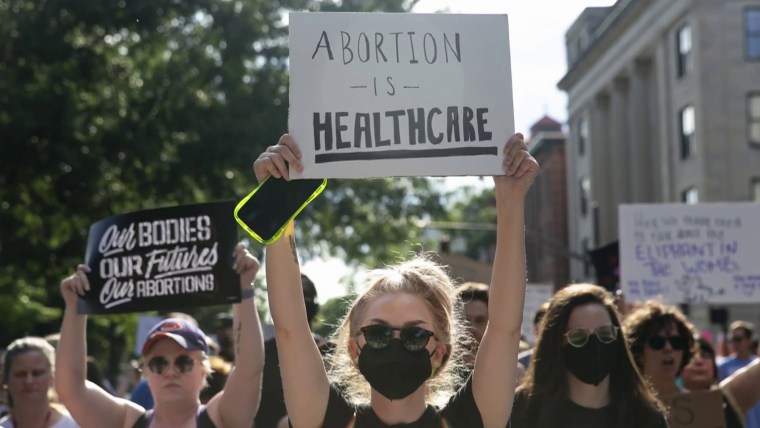Period trackers, location data, search histories, text messages: There is a veritable mountain of digital information that privacy advocates are now worried could be used by law enforcement in states that have banned abortion.
But not all those threats are the same. Legal experts are poring over how to interpret a patchwork of state abortion laws, and how digital information could be used to pursue criminal cases in relation to abortions.
Much of what exactly is and is not legal is still murky, but previous criminal cases that have used digital information to prosecute crimes offer some indication of how law enforcement could proceed.
The internet is filled with warnings that single points of digital health data, like details from a period tracking app or Google Maps showing that someone visited Planned Parenthood, could be used against someone in a criminal case. But experts who have studied cases in which people have been prosecuted for abortion-related crimes say those fears are largely misplaced.
Digital information and intent
In the few cases in which people have been charged, law enforcement has been mostly concerned with evidence that someone knowingly carried out an abortion-related crime. A period tracker can at best indicate that someone became and then no longer was pregnant, which stops short of proving they had an abortion.
Prosecutors instead often rely on a digital paper trail created by looking through a suspect’s smartphone. That means text messages, emails and search histories that show someone sought an abortion, said Cynthia Conti-Cook, a Ford Foundation fellow who authored an influential paper about digital evidence used in abortion prosecutions.
Searching on the internet for how to have an abortion isn’t illegal. But states have used search histories as evidence of intent in cases against people who were accused of illegally administering their own abortion.
“A prosecutor is always going to need some evidence of intent,” Conti-Cook said. “As long as we don’t have strong protections for digital self-incrimination, our digital devices will do the work of telling prosecutors what was in our minds at the moment we were accused of conduct related to the termination of a pregnancy.”
That means just about any form of digital communication could become evidence, though not all digital communication is easily acquired by law enforcement either through official requests or subpoenas. Law enforcement can get access to unencrypted information, but they can only view end-to-end encrypted messages such as those sent by apps like Signal by directly accessing a user’s device.
Period apps
The type of information that period-tracking apps store hasn’t been a priority for prosecutors. But some apps that track health data treat it more securely than others, and it’s impossible to fully predict all the ways that prosecutors could use sensitive information to charge someone.
Many period-tracking apps store patient information on one central server. That lets both law enforcement and malicious hackers know where they can go for all user information if they want to get it.
Some apps say they anonymize users’ profiles, though it’s often possible to reverse those kinds of tactics. Some period trackers keep all user information on the user’s phone, like the Flatcracker Software’s Period Plus app.
Abortion pills
Abortion pills pose one of the trickiest legal questions at the moment.
Anti-abortion laws tend to criminalize those who perform an abortion — the providers — and not those who receive one, said Elizabeth Nash, the state policy analyst at the Guttmacher Institute, a reproductive health nonprofit.
While that can provide some protection for people seeking an abortion for themselves, a few states have laws against people administering their own abortion, and it can be illegal for someone to order and take the pill without formal medical consultation, Nash said.
But unlike with some international online pharmacies, pills acquired through Aid Access, an international clinic, shouldn’t qualify as self-managed, because they first require an online consultation with a medical professional, according to Elisa Wells, co-founder of Plan C, a nonprofit devoted to sharing legal information about how to order abortion pills.
“It’s not a self-managed abortion,” Wells said. “You’re consulting with a doctor. You’re doing a medical consultation. You’re doing it online. The doctor writes you a prescription. The prescription goes to a licensed online pharmacy.”
So far, residents in all 50 states can order the pill online. And the international origin of most abortion pills offers something of a legal barrier. State law enforcement could subpoena an international online pharmacy or clinic for all users in their state. But those companies wouldn’t necessarily have to comply.
Location data
No state laws currently ban people from going from one state to another to get an abortion.
That means law enforcement would be unable to subpoena for location data related to an out-of-state abortion, since there would be no charges to bring.
But a person charged with receiving an abortion within a state where it is illegal could have their location data subpoenaed. In recent years courts have increasingly approved geofence warrants, which requires a tech or telecom company that tracks users’ location data to identify everyone who was in a designated area at a specific time.
Health and hospital data
Hospitals and other health care facilities track significant information on their patients. While there are federal regulations in place concerning how they store that data, like the Health Insurance Portability and Accountability Act (HIPAA), it’s unclear how much that will prevent health care workers from turning over abortion information to law enforcement in a post-Roe world, said Sara Geoghegan, a law fellow at the Electronic Privacy Information Center.
“It is tricky because people think HIPAA protects much more than it does. Ultimately I don’t think we have a safeguard right now if law enforcement has a warrant for clinic data,” Geoghegan said.
That means it could be possible for prosecutors to seize a doctor or nurse’s notes about what a specific patient said about their pregnancy status. But it doesn’t appear likely that law enforcement could conduct broad sweeps for all records in a hospital where a patient mentioned an abortion.
“One of the standards for a criminal warrant is you need to have reasonable suspicion, and it can’t be too broad. But honestly I don’t know how that would play out,” she said.
CORRECTION (June 29, 2022, 4:11 p.m. ET): A previous version of this article misstated the organization that Sara Geoghegan works for. She is a law fellow at the Electronic Privacy Information Center, not the Electronic Frontier Foundation.
Source: | This article originally belongs to Nbcnews.com











